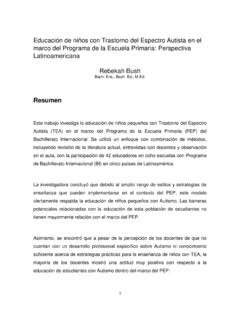Transcription of 366 bell hooks 24
1 366 bell hooksFrom bell hooks , Eating the other: Desire and resistance. In Black Looks: Race and Representa-tion, pp. 21 39. Boston: South End Press, the Other:Desire and Resistancebell hooksThis is theory s acute dilemma: that desire expresses itself most fully whereonly those absorbed in its delights and torments are present, that it triumphsmost completely over other human preoccupations in places sheltered fromview. Thus it is paradoxically in hiding that the secrets of desire come to light,that hegemonic impositions and their reversals, evasions, and subversions are attheir most honest and active, and that the identities and disjunctures betweenfelt passion and established culture place themselves on most vivid display. Joan Cocks, The Oppositional ImaginationWithin current debates about race and difference, mass culture is the contemporarylocation that both publicly declares and perpetuates the idea that there is pleasureto be found in the acknowledgment and enjoyment of racial difference.
2 The com-modification of Otherness has been so successful because it is offered as a newdelight, more intense, more satisfying than normal ways of doing and feeling. Withincommodity culture, ethnicity becomes spice, seasoning that can liven up the dulldish that is mainstream white culture. Cultural taboos around sexuality and desireare transgressed and made explicit as the media bombards folks with a message ofdifference no longer based on the white supremacist assumption that blondes havemore fun. The real fun is to be had by bringing to the surface all those nasty unconscious fantasies and longings about contact with the Other embedded in thesecret (not so secret) deep structure of white supremacy. In many ways it is acontemporary revival of interest in the primitive, with a distinctly postmodernslant.
3 As Marianna Torgovnick argues in Gone Primitive: Savage Intellects, ModernLives:Eating the Other 367 What is clear now is that the West s fascination with the primitive has to do with itsown crises in identity, with its own need to clearly demarcate subject and object evenwhile flirting with other ways of experiencing the from the standpoint of white supremacist capitalist patriarchy, the hopeis that desires for the primitive or fantasies about the Other can be continuallyexploited, and that such exploitation will occur in a manner that reinscribes andmaintains the status quo. Whether or not desire for contact with the Other, forconnection rooted in the longing for pleasure, can act as a critical interventionchallenging and subverting racist domination, inviting and enabling critical resist-ance, is an unrealized political possibility.
4 Exploring how desire for the Other isexpressed, manipulated, and transformed by encounters with difference and thedifferent is a critical terrain that can indicate whether these potentially revolutionarylongings are ever working-class British slang playfully converges the discourse ofdesire, sexuality, and the Other, evoking the phrase getting a bit of the Other asa way to speak about sexual encounter. Fucking is the Other. Displacing the notionof Otherness from race, ethnicity, skin-color, the body emerges as a site of contesta-tion where sexuality is the metaphoric Other that threatens to take over, consume,transform via the experience of pleasure. Desired and sought after, sexual pleasurealters the consenting subject, deconstructing notions of will, control, coercive domina-tion.
5 Commodity culture in the United States exploits conventional thinking aboutrace, gender, and sexual desire by working both the idea that racial differencemarks one as Other and the assumption that sexual agency expressed within thecontext of racialized sexual encounter is a conversion experience that alters one splace and participation in contemporary cultural politics. The seductive promise ofthis encounter is that it will counter the terrorizing force of the status quo thatmakes identity fixed, static, a condition of containment and death. And that it is thiswillingness to transgress racial boundaries within the realm of the sexual that eradicatesthe fear that one must always conform to the norm to remain safe. Difference canseduce precisely because the mainstream imposition of sameness is a provocationthat terrorizes.
6 And as Jean Baudrillard suggests in Fatal Strategies:Provocation unlike seduction, which allows things to come into play and appear insecret, dual and ambiguous does not leave you free to be; it calls on you to revealyourself as you are. It is always blackmail by identity (and thus a symbolic murder, sinceyou are never that, except precisely by being condemned to it).To make one s self vulnerable to the seduction of difference, to seek an encounterwith the Other, does not require that one relinquish forever one s mainstreampositionality. When race and ethnicity become commodified as resources for pleasure,the culture of specific groups, as well as the bodies of individuals, can be seen asconstituting an alternative playground where members of dominating races, genders,sexual practices affirm their power-over in intimate relations with the Other.
7 Whileteaching at Yale, I walked one bright spring day in the downtown area of New368 bell hooksHaven, which is close to campus and invariably brings one into contact with manyof the poor black people who live nearby, and found myself walking behind a groupof very blond, very white, jock type boys. (The downtown area was often talkedabout as an arena where racist domination of blacks by whites was contested on thesidewalks, as white people, usually male, often jocks, used their bodies to force blackpeople off the sidewalk, to push our bodies aside, without ever looking at us oracknowledging our presence.) Seemingly unaware of my presence, these young mentalked about their plans to fuck as many girls from other racial/ethnic groups as theycould catch before graduation.
8 They ran it down. Black girls were high on thelist, Native American girls hard to find, Asian girls (all lumped into the same category),deemed easier to entice, were considered prime targets. Talking about this over-heard conversation with my students, I found that it was commonly accepted that one shopped for sexual partners in the same way one shopped for courses at Yale,and that race and ethnicity was a serious category on which selections were these young males and their buddies, fucking was a way to confront theOther, as well as a way to make themselves over, to leave behind white innocence and enter the world of experience. As is often the case in this society, they wereconfident that non-white people had more life experience, were more worldly, sensual,and sexual because they were different.
9 Getting a bit of the Other, in this caseengaging in sexual encounters with non-white females, was considered a ritual oftranscendence, a movement out into a world of difference that would transform, anacceptable rite of passage. The direct objective was not simply to sexually possess theOther; it was to be changed in some way by the encounter. Naturally, the pres-ence of the Other, the body of the Other, was seen as existing to serve the ends ofwhite male desires. Writing about the way difference is recouped in the West in The Primitive Unconscious of Modern Art, or White Skin, Black Masks, HalFoster reminds readers that Picasso regarded the tribal objects he had acquired as witnesses rather than as models. Foster critiques this positioning of the Other,emphasizing that this recognition was contingent upon instrumentality : In thisway, through affinity and use, the primitive is sent up into the service of the Westerntradition (which is then seen to have partly produced it).
10 A similar critique can bemade of contemporary trends in inter-racial sexual desire and contact initiated bywhite males. They claim the body of the colored Other instrumentally, as unexploredterrain, a symbolic frontier that will be fertile ground for their reconstruction of themasculine norm, for asserting themselves as transgressive desiring subjects. They callupon the Other to be both witness and participant in this white boys to openly discuss their desire for colored girls (or boys) publiclyannounces their break with a white supremacist past that would have such desirearticulated only as taboo, as secret, as shame. They see their willingness to openlyname their desire for the Other as affirmation of cultural plurality (its impact onsexual preference and choice).





